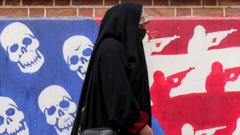As US-Iran nuclear discussions approach, the gap between their positions appears vast, raising concerns about potential military action if negotiations falter.**
High Stakes for US-Iran Nuclear Negotiations Amidst Diplomatic Tensions**

High Stakes for US-Iran Nuclear Negotiations Amidst Diplomatic Tensions**
Iran and the US remain divided as nuclear talks loom, with each side holding firm to their demands.**
In the lead-up to crucial nuclear talks, tensions remain palpable between the United States and Iran. Since his inauguration, President Trump has aimed to address ongoing conflicts like Gaza and Yemen, and now turns his focus to Iran—an issue considered unfinished business from his previous term.
The primary dilemma centers around Iran's nuclear ambitions; while Tehran vehemently denies any intent to develop nuclear weapons, suspicions persist that the country seeks, at the very least, the capability to produce a warhead. This contentious situation could ignite not just an arms race, but potentially outright war in the Middle East.
In 2015, Iran entered the Joint Comprehensive Plan of Action (JCPOA), an agreement designed to limit its nuclear developments in exchange for the easing of sanctions. Trump's withdrawal from this deal in 2018 reignited concerns, leading to renewed sanctions and increased uranium enrichment by Iran, heightening fears that the nation could soon have the means to create nuclear weapons.
Upon assuming office, Trump reinstated his "maximum pressure" campaign against Iran, enforcing tighter economic sanctions and targeting nations purchasing Iranian oil. Recently, he initiated diplomacy efforts by reaching out to Iran's Supreme Leader, proposing negotiations as a path to a resolution, with direct discussions in Oman planned for the coming weekend.
The stakes are high, as Trump explicitly communicated that failure to reach a deal would lead to significant risks for Iran. While some Iranian policymakers prefer negotiations to alleviate their nation's crippled economy, hardliners may resist any compromises necessary to move forward. The entrenched positions of both countries remain a significant hurdle, particularly as the US demands full dismantlement of Iran's nuclear program, a non-starter for Tehran.
Israel’s perspective complicates these discussions further, insisting on the termination of any Iranian nuclear capability while retaining skepticism about the turnout of the negotiations. There remains a looming question of what military responses could ensue should dialogue collapse, highlighting the precarious balance of power in the region.
As the clock ticks, each side must navigate their stance carefully, with Trump setting a two-month timeline for an agreement. Given the extensive history of negotiations, rushing these talks may prove detrimental to achieving long-lasting peace. The world watches closely, knowing that the consequences of failure could be devastating.
The primary dilemma centers around Iran's nuclear ambitions; while Tehran vehemently denies any intent to develop nuclear weapons, suspicions persist that the country seeks, at the very least, the capability to produce a warhead. This contentious situation could ignite not just an arms race, but potentially outright war in the Middle East.
In 2015, Iran entered the Joint Comprehensive Plan of Action (JCPOA), an agreement designed to limit its nuclear developments in exchange for the easing of sanctions. Trump's withdrawal from this deal in 2018 reignited concerns, leading to renewed sanctions and increased uranium enrichment by Iran, heightening fears that the nation could soon have the means to create nuclear weapons.
Upon assuming office, Trump reinstated his "maximum pressure" campaign against Iran, enforcing tighter economic sanctions and targeting nations purchasing Iranian oil. Recently, he initiated diplomacy efforts by reaching out to Iran's Supreme Leader, proposing negotiations as a path to a resolution, with direct discussions in Oman planned for the coming weekend.
The stakes are high, as Trump explicitly communicated that failure to reach a deal would lead to significant risks for Iran. While some Iranian policymakers prefer negotiations to alleviate their nation's crippled economy, hardliners may resist any compromises necessary to move forward. The entrenched positions of both countries remain a significant hurdle, particularly as the US demands full dismantlement of Iran's nuclear program, a non-starter for Tehran.
Israel’s perspective complicates these discussions further, insisting on the termination of any Iranian nuclear capability while retaining skepticism about the turnout of the negotiations. There remains a looming question of what military responses could ensue should dialogue collapse, highlighting the precarious balance of power in the region.
As the clock ticks, each side must navigate their stance carefully, with Trump setting a two-month timeline for an agreement. Given the extensive history of negotiations, rushing these talks may prove detrimental to achieving long-lasting peace. The world watches closely, knowing that the consequences of failure could be devastating.



















